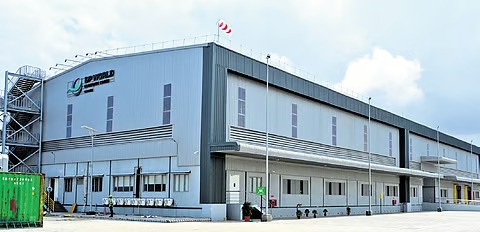
DP World’s Cochin FTWZ drives spice export growth with tech, infrastructure
KOCHI : Driven by supportive policies and expanding global market, DP World’s Cochin Free Trade Warehousing Zone (FTWZ) — which already handles a significant share of India’s spice trade, is poised for further growth with investments in temperature-controlled warehousing for sensitive commodities such as cardamom to create a resilient and future-ready hub for India’s growing spice trade, said Ranjit Ray, Senior Vice President – Economic Zones and Contract Logistics, MENA and India Subcontinent, DP World.
Over the past year, there has been a marked increase in demand from spice exporters, who benefited from using the FTWZ facility to enhance their export efficiency and competitiveness, thus reflecting the growing importance of Cochin as both a manufacturing and trading hub, he said.
While global challenges—such as tariff changes in the US—pose occasional headwinds, FTWZs provide a strategic buffer, ensuring cargo integrity and supply chain agility amid shifting trade dynamics. Freight rates, though variable, have not dampened the outlook for spices, a commodity with enduring global demand, he said in an email interaction.
Set for global leadership
He is confident that with infrastructure support, digital adoption and Kerala’s natural advantages, India’s spice sector is well-positioned to strengthen its leadership in the global market.
The Cochin FTWZ is uniquely equipped to serve the spice sector, offering over 67 value-added services, including fumigation, plant quarantine, labelling, repackaging, and quality inspections. These facilities safeguard product integrity while ensuring compliance with stringent global standards. For exporters, the benefits translate into faster access to international markets, optimised inventory management, and reduced spoilage—key to sustaining Kerala’s global reputation for premium spices.
The backbone of India’s spice trade is its network of MSMEs. For these businesses, digital platforms and integrated logistics are proving transformative. National initiatives, such as the Unified Logistics Interface Platform (ULIP), Open Network for Digital Commerce (ONDC), and National Logistics Portal (NLP), are simplifying exports by enhancing transparency, enabling real-time cargo tracking, and streamlining compliance.
Benefitting MSMEs
Within DP World’s ecosystem, technology-driven platforms like Cargo Flow further extend these benefits. With IoT-enabled tracking, digital documentation, and single-window customs clearance, exporters can cut lead times, reduce delays, and ensure reliable delivery schedules. For MSMEs, this levels the playing field, allowing them to scale their operations, meet international standards, and confidently compete with global players. With modern warehousing and logistics infrastructure, the state is evolving into a global sourcing hub.
Facilities such as moisture-controlled storage, pest-controlled handling, and sampling support at Cochin FTWZ not only preserve quality but also facilitate informed decision-making for international buyers, he said.
In FY 2024–25, India exported nearly 18 lakh tonnes of spices, valued at over $4.7 billion, a 17 per cent year-on-year growth, according to Spices Board figures. Much of this momentum is driven by Kerala’s premium produce, including pepper, cardamom, turmeric, nutmeg, and cloves. Yet, what is propelling this traditional sector into a modern global force is the synergy of Free Trade Warehousing Zones, digital innovation, and logistics support

